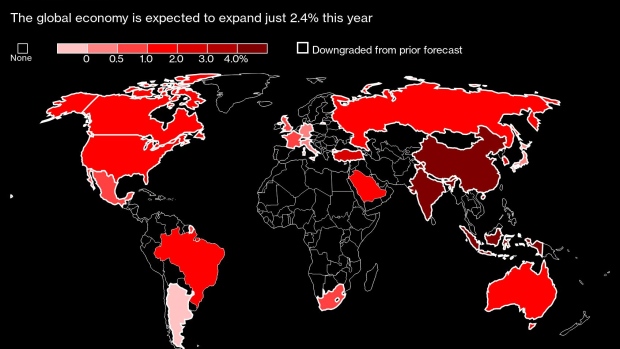Mar 3, 2020
G-7 Set for Emergency Coronavirus Call With Economy Under Threat
, Bloomberg News

(Bloomberg) --
Group of Seven finance chiefs will hold a rare conference call Tuesday under pressure from investors to match their pledges to shield the world economy from the coronavirus with action.
The G-7 officials, including U.S. Treasury Secretary Steven Mnuchin and Federal Reserve Chairman Jerome Powell, will speak around 7 a.m. Washington time. A statement is expected to be released afterward.
The call comes hours after policy makers stepped up their responses to the health crisis. Australia cut interest rates to a record low, Malaysia’s central bank eased policy, and European Central Bank President Christine Lagarde belatedly followed her major counterparts in saying late Monday that her institution stands “ready to take appropriate and targeted measures” as needed.
Investors may still need to brace for a letdown if they’re hoping the G-7 will deliver coordinated rate cuts and fiscal packages akin to those seen during the financial crisis of 2008-09. A draft of the communique lacks a call for easier and united fiscal and monetary policies, according to Reuters.
“It is important for the G-7 statement to contain explicit commitment to some form of action,” said Khoon Goh, Singapore-based head of Asia research at Australia & New Zealand Banking Group Ltd. “Markets have already recovered in anticipation of some kind of policy move, and the risk is that a bland statement that lacks coordinated effort will disappoint markets and lead to a renewed selloff.”
Seemingly sanguine about the economic fallout from the virus just a week ago, G-7 policy makers have been jolted from their complacency by sliding stocks and warnings that the world economy is barreling toward its worst year since 2009, perhaps even a recession.
Money markets predict a high chance of a 10 basis point cut at the ECB this month, 25 basis points at the Bank of England, and 50 basis points at the Fed. All are due to meet in coming weeks, though they could move before their scheduled decisions if they see the need.
Australia got the ball rolling on Tuesday by lowering its benchmark rate a quarter percentage point to 0.5%, citing the “significant effect” of the virus on an economy highly dependent on China for demand and trade. Even that wasn’t enough for some investors -- the Australian dollar and bond yields climbed. Governor Philip Lowe said he is prepared to ease further.
Malaysia reduced its overnight policy rate for a second time this year, lowering it by 25 basis points to 2.5%, the lowest since July 2010. Indonesia had relaxed its reserve ratio for banks a day earlier.
For some, a rate reduction might be too tough a decision. Lagarde’s relatively late statement and her reference to “targeted” measures may reflect a reluctance at the ECB to cut further, after more than half a decade of negative rates and 2.6 trillion euros ($2.9 trillion) of bond purchases. It might instead opt for an alternative measure such as easier terms on its long-term loans to banks.
“We need to see governments taking action” as well as central banks, Paul Flood, a money manager at Newton Investment Management, told Bloomberg Television. “You’d really like to see some form of corporation tax cut, or business rate cut, something that helps companies deal with the fact that they are going to see lower business, especially if we see what happened in China happen in the U.S. and Europe, businesses close down for prolonged periods.”
--With assistance from Nejra Cehic, Simon Kennedy and James Hirai.
To contact the reporters on this story: Enda Curran in hong kong at ecurran8@bloomberg.net;Michelle Jamrisko in Singapore at mjamrisko@bloomberg.net
To contact the editors responsible for this story: Paul Gordon at pgordon6@bloomberg.net, Fergal O'Brien
©2020 Bloomberg L.P.